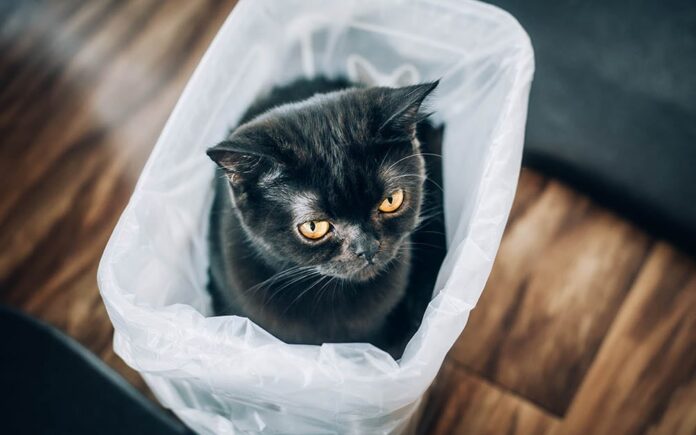If you’re wondering why does my cat pee on plastic bags, you’re not alone. This peculiar behavior can be frustrating for cat owners, but there’s actually some interesting science behind it. Let’s dive into the reasons and solutions for this common feline issue.
The Science Behind Cats and Plastic Bags
Cats have a complex relationship with plastic materials and their attraction to plastic bags isn’t just random. The chemical compounds in plastic bags, particularly those containing cornstarch or other biodegradable materials can emit scents that attract cats. These scents might remind them of their natural marking territory instincts.
Common Reasons Why Cats Pee on Plastic Bags
1. Chemical Attraction
- Plastic bags contain chemicals that may smell like pheromones
- Some bags have animal-based products in their composition
- The crinkly texture might trigger territorial marking
2. Medical Issues
- Urinary tract infections
- Kidney problems
- Stress-related conditions
3. Behavioral Factors
- Marking territory
- Stress or anxiety
- Changes in environment
How to Stop Your Cat from Peeing on Plastic Bags
-
Store Bags Properly
- Keep bags in closed containers
- Store them in high places
- Use pet-proof storage solutions
-
Medical Check-up
- Visit your vet regularly
- Monitor urinary habits
- Check for signs of stress
-
Environmental Management
- Provide multiple litter boxes
- Keep litter boxes clean
- Create a stress-free environment
For more detailed information about cat behavior and training tips, check out these helpful dog-related articles that can give you insights into pet behavior in general.
Prevention Tips
-
Proper Storage
- Store plastic bags in drawers or cabinets
- Use sealed containers
- Keep bags out of reach
-
Alternative Solutions
- Use cloth bags instead
- Dispose of plastic bags immediately
- Consider eco-friendly alternatives
When to Seek Professional Help
If your cat continues to pee on plastic bags despite implementing these solutions, it might be time to consult a professional. Pet like boss offers comprehensive resources and expert advice for pet owners dealing with behavioral issues.
Signs That Require Immediate Attention
- Frequent urination
- Blood in urine
- Changes in behavior
- Loss of appetite
Understanding Your Cat’s Needs
Cats are complex creatures with unique needs and behaviors. Sometimes, what we perceive as problematic behavior is actually their way of communicating something important. Here are some key points to remember:
-
Environmental Enrichment
- Provide climbing spaces
- Offer scratching posts
- Create hiding spots
- Supply interactive toys
-
Stress Reduction
- Maintain routine
- Provide quiet spaces
- Minimize changes
- Use calming products
FAQs About Cats Peeing on Plastic Bags
Q: Is this behavior dangerous for my cat?
A: While the behavior itself isn’t immediately dangerous, it could indicate underlying health issues that need attention.
Q: Can this behavior be completely stopped?
A: Yes, with proper management and addressing the root cause, this behavior can usually be corrected.
Q: Should I punish my cat for this behavior?
A: No, punishment can increase stress and make the problem worse. Focus on positive reinforcement and addressing the underlying cause.
Final Thoughts
Understanding why does my cat pee on plastic bags requires patience and observation. By implementing the suggested solutions and maintaining open communication with your veterinarian, you can help your feline friend develop better habits.
Remember that each cat is unique, and what works for one might not work for another. Stay patient and consistent in your approach, and don’t hesitate to seek professional help if needed.
Quick Action Steps:
- Remove accessible plastic bags
- Schedule a vet check-up
- Monitor behavior changes
- Implement prevention strategies
- Maintain consistent routines
By following these guidelines and understanding your cat’s needs, you can create a harmonious environment that discourages unwanted behavior while promoting your pet’s well-being. Remember, your furry friend isn’t trying to be difficult – they’re just being cats!
Note: This article has been written in a conversational tone to help pet owners better understand and relate to their cats’ behavior. While maintaining accuracy, we’ve kept the language accessible and engaging for all readers.












